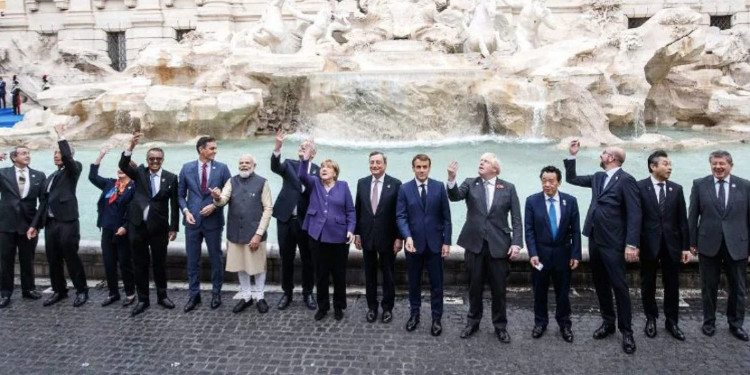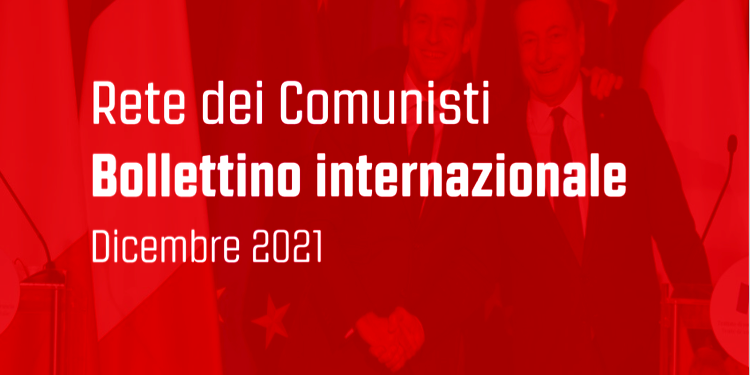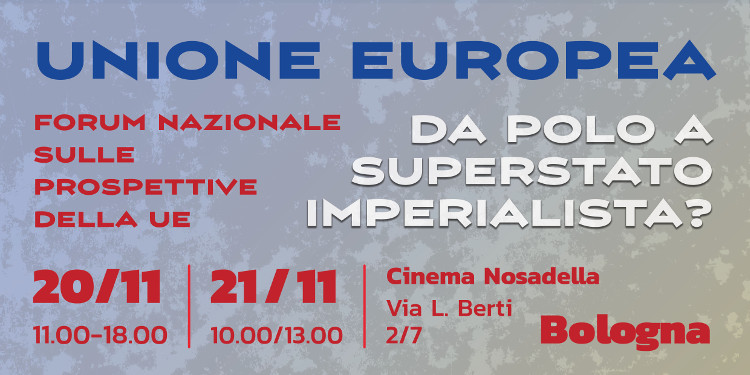| english | español | français | italiano |
Mauro Casadio, Rete dei Comunisti
At the end of this year, we have been subjected to a systematic ideological bombardment that began with the G20 meeting in Rome, which neither China nor Russia attended, and continued with COP 26 on the environment.
These summits repeated speeches and formulas that have been repeated for years, without any practical effect and once again giving birth not to a mouse but to a spider mouse.
Summits that are cloaked in a tiresome and annoying rhetoric and that can be compared to those made by European royal families before the Great War in which they patronisingly displayed the good ties between reigning relatives as a guarantee for the peoples of Europe, and then we know how that turned out.
A parody of those moments was the ridiculous farce at the Trevi fountain where all the heads of state pathetically threw a coin into the fountain together.
The ideological amplification of events is a product which is directly proportional to the difficulties and inability of the dominant groups in the imperialist countries to solve the problems they have raised, which have become unmanageable and beyond their reach.
This interpretation is not just one of our sectarian and extremist opinions, but is a snapshot of a situation that was already evident in August with the flight of the USA and NATO from Afghanistan, where the ideological defeat of the countless “humanitarian wars” that have been foisted on us in recent decades weighed more than the military defeat.
Today, in fact, these can no longer be reproposed, such is the discredit suffered by the imperialist interventionism of the beginning of the century, comparable to the colonial wars of the 19th century.
Even the cynical abandonment of Afghan collaborationists to their fate in the hands of the Taliban is a further element of hegemonic crisis in that the US allies know from the facts that they can be dumped at any time by their “protectors”
But why is it that those powers that until recently thought they were the masters of the world can now only attempt to hide their impotence with the rhetoric of their ideology? The reason lies in the stage reached by the productive forces and the globalisation of capitalist relations.
In history, the hegemonic capitalisms of the various epochs were replaced in their competition with their “peers” by the new up-and-coming economies, as happened to Holland in its confrontation with England and to England with the European imperialisms at the turn of the nineteenth and twentieth centuries, a competition that finally ended in favour of the United States after the Second World War.
This evolution by competition could be reproduced because the material spaces for such growth existed and because the “revolutionary” character of the bourgeoisie was expressed through the continuous change and development of science and technology applied to capitalist production, both civil and military.
It is on this level that the socialist experience of the USSR was also defeated as it lingered on a militarist competition that prevented it from seeing that this revolutionary character of capital was by no means dormant despite the crisis of the 1970s, which is why the world today has been completely capitalised by the upward movement of capital.
The effect that emerges today from such a dynamic is that this dimension of development triggers a phase of crisis starting with that of historical capitalisms. The rise of China, the emergence of intermediate economic powers such as India, Russia, Iran, Vietnam, Brazil and others, has led to a saturation of the economic and financial space that has not yet been resolved, and has increased hypercompetition, which EU President Ursula Van Der Leyen was kind enough to tell us about.
But Biden also said at his summit with Chinese President Xi that the two countries are “competitors” but not “enemies”.
On the other hand, the classic ‘solution’ of the generalised destruction of capital, i.e. world wars, to relaunch development and assert a dominant hegemony are hardly feasible given the international intertwining of the financial dimension and the destructive level of atomic weapons.
And it is certainly no coincidence that today the discussion on the use of atomic energy, a use that can always be converted into instruments of war, is gaining momentum
If this is the depth of the question, it is no longer sufficient to have an interpretation based on capitalisms and their competition as ‘epiphenomena’ of a structural arrangement. What is emerging is a limitation of the capitalist mode of production, regardless of the specific historical forms it has taken, which tends towards the valorisation of capital to infinity.
The point is that this tendency comes into contradiction with a limited natural system, and although it is still possible to postpone the terms of such a structural contradiction in the short term, it is clear that what is at stake today is the replacement of the MPC with a systemic alternative, or, as has been repeatedly said, with the mutual destruction of the classes in struggle.
The orgy of ideology to which we are subjected on a daily basis by the mass media, bourgeoisie-organic intellectuals and state apparatuses has exactly this purpose, not to confront the contradiction out of powerlessness but to try to anaesthetise the political reactions of the subordinate classes and the peoples of the periphery.
It is precisely at this point that the environmental question is no longer an issue for intellectual ‘elites’, born even of the English nobility as “La Repubblica” tells us, but must become the subject of political action for class and communist forces.
In reality, a response is already underway in terms that we could classically define as “democratic”, we are seeing it in the squares that are following Greta Thunberg, who is benefiting from media coverage that is in some ways suspicious, even though she is setting in motion youthful masses that, within the contradictions of the system, are not necessarily going where the television stations want them to go.
Greta’s accusation that the powerful only do blah blah blah blah is a symptom of a difficulty and division that could emerge sooner or later in that movement.
Large sectors of intellectuals and scientists are also speaking out, denouncing the inadequacy of the choices made by governments in clearly useless and damaging summits, but all these subjects carefully avoid uttering the ‘forbidden’ word of Capitalism.
So the responsibility is generally man’s, even Homo Sapiens’s, as if the social and productive order does not have structural contradictions, but it is the fault of politicians, industrialists, governments, etc. In short, for them too, the story is over and all that remains is a problem of conscience on the part of the various players in the field.
It is clear that this upheaval among young people and their consciences is not the direct political product of the class struggle, but is the sign that a new conflictual condition is opening up in which the class forces can play a role of conscience and knowledge, both on general issues related to the environment and the climate, and on more directly political issues such as the civil nuclear issue in our country.
The Draghi government and its Minister for Ecological Transition (to where?), Cingolani, are producing a new paradox: they are proposing, along with the entire EU, more or less explicitly, the resumption of civil nuclear power with fourth-generation plants that would be a clean energy source, unlike fossil fuels, coal and oil.
This attempt is supported by a number of political forces in the country, and Berlusconi’s former minister Lupi has tabled a motion in parliament in support of “green nuclear power”, which Cingolani is trying to cover up with bogus declarations on nuclear fusion, knowing full well that this possibility is a long way off.
Therefore, the field of conflict that is opening up on environmental sustainability is vast and requires a politically antagonistic approach, both in the general battles to denounce and demystify the choices represented in major shows such as COP 26, which will be repeated next year, and in areas much closer to home, such as the attempt to reintroduce civil nuclear power, which was rejected in Italy in two referendums in 1987 and 2011. And this is an appointment of struggle not to be missed.





